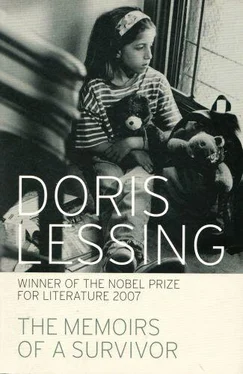I sat listening. I sat by myself and listened. It was warm, over-warm; it was that hot final summer. There was often thunder, sudden dry storms; there was restlessness in the streets, the need to move… I would make little tasks for myself, because I had to move. I sat, or kept myself busy, and I listened. One morning Emily came in, all brisk and lively, and, seeing me at work setting plums on trays to dry, she joined me. She was wearing that morning a striped cotton shirt, and jeans. The shirt lacked a button at breast-level, and gaped, showing her already strong breasts. She looked tired, as well as full of energy; she had not yet bathed, and a smell of sex came from her. She was fulfilled and easy, a bit sad, but humorously so. She was, in short, a woman, and she sat smiling and wiping plums with slow easy movements, all the hungers, the drives and the needs pounded and hunted out of her, exorcised in the recent lovemaking. And all the time, that child was crying. I was looking at her; I was thinking as the elderly do, wrestling with time, the sheer cussedness of the thing — futilely (but they cannot help it), using the thought over and over again as a kind of measure or guideline: That was fourteen years ago, less, when you wept so painfully and for so long because of your incomprehension and because of your scalded buttocks and thighs and legs. Fourteen years for me is so short a time, it weighs so light in my scale: in yours, in your scale, it is everything, your whole life.
She, thinking of time, speaking of it as a girl was once expected to while she marked the slow overtaking of the milestones one by one into womanhood and freedom, said 'I'm coming up to fifteen,' because she had just passed her fourteenth birthday. She had said that only yesterday; she was capable of talking like that, even pertly and with a fling of her hair, like a 'young girl'. Meanwhile she had just come from lovemaking, and no girl's lovemaking at that.
All that morning I listened to the sobbing while I sat working with her. But Emily heard nothing, though I couldn't believe it.
'Can't you hear someone crying?' I asked, as casual as could be, while I was twisting and turning inwardly not to hear that miserable sound.
'No, can you?' And off she went to stand at the window, Hugo beside her. She was looking to see if Gerald had arrived yet. He had not. She went to bath, to dress; at the window she stood waiting — yes, he was just arriving. And now she would stand there a little longer, careful not to see him, so as to assert her independence, to emphasise this other life of hers with me. She would linger half an hour, an hour. She would even sit down again with her ugly yellow animal, fondling and teasing him. Her silence would grow tense, her stares out of the window more stylised: Girl at Window Oblivious of her Lover. Then her hand on the animal's head, stroking and patting, would forget him, would fall away. Gerald had seen her. He had noticed her not noticing him. He had turned away: unlike her, he genuinely did not care very much, or rather, he did care, but not at all in the same way. At any rate, now, this afternoon, June was there, and Maureen, a dozen other girls. And Emily could not bear it. She went, with a kiss for her Hugo. As for me I got the ritual: 'I'll just go out for a little if that is all right with you.'
And in a moment she was with them, her family, her tribe, her life. A striking-looking girl, with her dark hair flat on either side of a pale, too-earnest face, she was where Gerald was, who swaggered there with the knives in his belt, his whiskers, his strong brown arms. Good Lord, how many centuries had we overturned, how many long slow steps of man's upclimbing did Emily undo when she crossed from my flat to the life on the pavement! And what promise, what possibilities, what experiments, what variations on the human theme had been cancelled out! Watching, I fell into despair at the precariousness of every human attempt and effort, and I left the window. It was that afternoon I tried deliberately to reach behind the wall: I stood there a long time looking and waiting. The wall did not have light lying there now, was uniform, dull, blank. I went up and pressed my palms against it, and moved my hands all over it, feeling and sensing, trying everything to make the heavy solidity of the thing go down under the pressure of my will. It was nonsense, I knew that; it was never because of my, or anybody's, wanting when that wall went down and made a bridge or a door. But the interminable low sobbing, the miserable child, was driving me frantic, was depriving me of ordinary sense… yet by turning my head I could see her, a lusty young girl on the pavement, unsmiling perhaps, because of her in nate seriousness, but very far indeed from weeping. It was the child I wanted to pick up and kiss and soothe. And the child was so close, it was a question only of finding the right place on the wall to press, as in the old stories. A particular flower in the pattern, or a point found by counting just so many inches from here to there and then gently pushed… but of course, I knew there could be nothing in a deliberate attempt of the will. Yet I stood there all afternoon, and into the evening, as it darkened outside and the flares were lit on the pavement, showing the crowding masses eating, drinking, milling about in their clans and alliances. I let my palms move over the wall, slowly, inch by inch, but I did not find a way in that day, nor the next, I never did find that weeping child who remained there, sobbing hopelessly alone and disowned, and with long years in front of her to live through before time could put strength into her and set her free.
I never found Emily. But I did find… the thing is, what I did find was inevitable. I could have foreseen it. The finding had about it, had in it as its quintessence, the banality, the tedium, the smallness, the restriction, of that 'personal' dimension. What else could I find — unexpectedly, it goes without saying — when behind that wall I ran and ran along passages, along corridors, into rooms where I knew she must be but where she was not, until at last I found her: a blonde blue-eyed child, but the blue eyes were reddened and sullen with weeping. Who else could it possibly be but Emily's mother, the large carthorse woman, her tormentor, the world's image? It was not Emily I took up in my arms, and whose weeping I tried to shush. Up went the little arms, desperate for comfort, but they would be one day those great arms that had never been taught tenderness; the face, scarlet with need, was solaced at last into a pain-drained exhaustion as the fair little child collapsed, head on my shoulder, and the soft wisps of gold baby — hair came up dry and pretty as I rubbed the dank strands gently through my fingers, to absorb the sweat. A pretty, fair little girl, at last finding comfort in my arms… and who was it I saw at an earlier stage than the scene where a little girl joyously smeared the chocolate-brown faeces into her hair, her face, her bedding? For once, following a low sobbing, I walked into a room that was all white and clean and sterile, the nightmare colour of Emily's deprivation. A nursery. Whose? This was before a brother or sister had been born, for she was tiny, a baby, and alone. The mother was elsewhere, it was not time to feed. The baby was desperate with hunger. Need clawed in her belly, she was being eaten alive by the need for food. She yelled inside the thick smothering warmth; sweat scattered off her scarlet little face; she twisted her head to find a breast, a bottle, anything: she wanted liquid, warmth, food, comfort. She twisted and fought and screamed. And screamed — for time must pass before she was fed, the strict order of the regime said it must be so: nothing could move that obdurate woman there, who had set her own needs and her relation with her baby according to some timetable alien to them both, and who would obey it to the end. I knew I was seeing an incident that was repeated again and again in Emily's? her mother's? — early life. It was a continuing thing; had gone on, day after day, month after month. There had been a screaming and hungry, then a whimpering and sullen, baby, wanting the next meal which did not come, or if it did come, was not enough. There was something in that strong impervious woman which made this so, dictated it. Necessity. The strict laws of this small personal world. Heat. Hunger. A fighting of emotion. The hot red running of flames from a barred fireplace on white walls, white wool, white wood, white, white. The smell of sick rising from the wet that grated under the chin, the smell of wet heavy wool. And smallness, extreme smallness, weakness, a helplessness reaching out and crying for the little crumbs of food, freedom, variation of choice which were all that could reach this little hot place where the puppets jerk to their invisible strings.
Читать дальше
Конец ознакомительного отрывка
Купить книгу












